All hues or some shades in North Waziristan?
- Published
The BBC has obtained rare footage of the Pakistani army's strikes on the Taliban in North Waziristan, as Andrew North reports
The BBC has obtained exclusive footage of the aftermath of Pakistani air strikes against the Taliban in North Waziristan - but some say it's still protecting certain militants it has supported in the past.
Major General Asim Bajwa painted a clear picture.
"We are going after terrorists of all hue and colour," he told journalists at a briefing on the Pakistani army's operation against militant havens in North Waziristan.
Conjuring visions of the Stalingrad "kettle" in World War Two, he said Pakistani troops now had the whole area surrounded: "They cannot escape."
But many reports, as well as footage obtained by the BBC, suggest some militants at least got away and some shades of "terrorist" may still be safe.
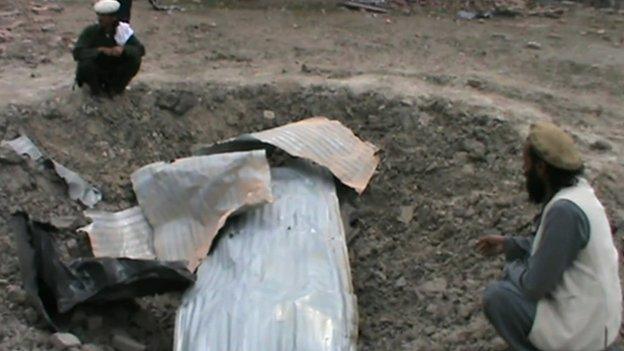
Villagers in North Waziristan show destruction caused by air strikes
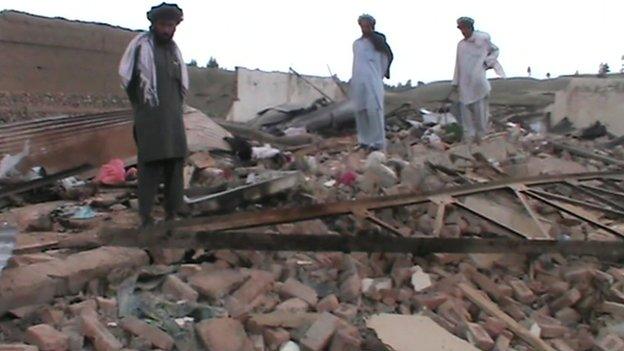
In this image, local villagers in North Waziristan survey the damage
'Militant warehouse'
This is the operation many inside and outside Pakistan say should have begun long ago, as North Waziristan was allowed to become a veritable warehouse for all brands of Islamic militancy.
It's from there that the Pakistani Taliban have been mounting their deadly suicide offensive for the past seven years, killing thousands of people across Pakistan.
The Pakistani Taliban are the chief target of Operation Zarb-e-Azb - named after the sword of the Prophet Muhammad.
But also thought to be in the army's crosshairs are al-Qaeda, and Uzbek militants who claimed to have carried out last month's deadly attack on Karachi airport.
As those devastating images flashed around the world, the operation in North Waziristan finally got the go-ahead after years of stalling.
The delay has done severe damage to Pakistan "both internally and internationally", says former army spokesman Maj-Gen Athar Abbas.
Hundreds of thousands of people have now been displaced from North Waziristan by the army offensive.
But there are also widespread reports many militants escaped, or were alerted beforehand - including members of the Haqqani network, blamed for a string of high-profile attacks in Afghanistan.
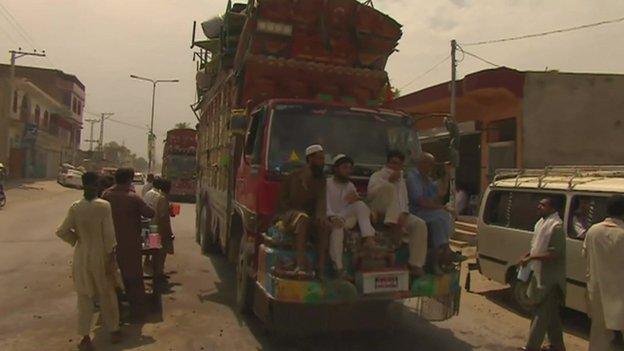
Thousands of people have been forced to flee the violence
Rare access
It's almost impossible to find out what is happening inside the tribal area now.
Difficult for outsiders to enter at any time, the army has barred all access.
But the BBC has obtained footage from a professional cameraman who got into North Waziristan with help from the Taliban, as the campaign began.
He spent a week travelling there, filming the aftermath of several Pakistani strikes - although he admits he was not allowed to record everything he saw.
We can't identify him for his own security.
At one point, he met a local Taliban commander who was escaping across the border to Afghanistan in his pick-up, just a short drive down the road.
But underlining fears of a potential backlash, the commander vowed to take revenge on Pakistan "until doomsday".
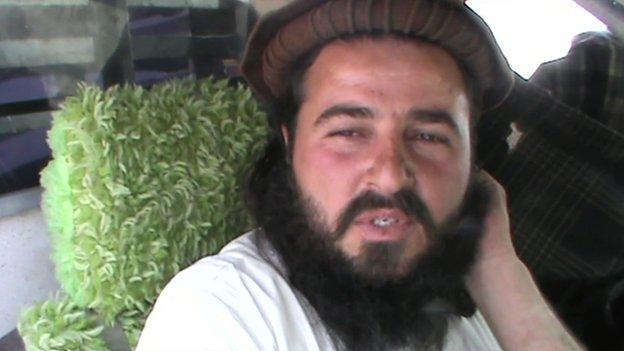
Taliban commander Zahir Wazir vowed revenge on Pakistan before heading to Afghanistan
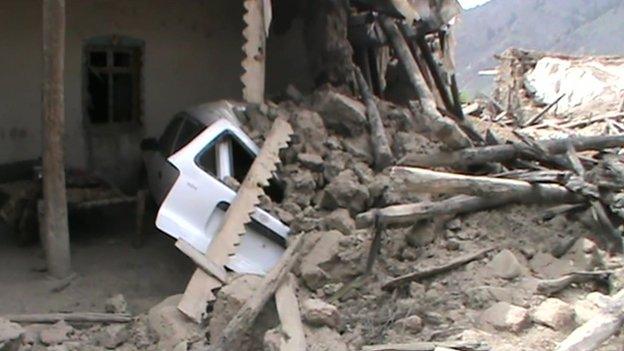
This image shows wreckage of a house in North Waziristan
Militants were killed in some strikes, people in the border village of Gorbaz told the cameraman, but claimed civilians had perished too.
Uzbek militants had reportedly been using the same border area as a base.
Staying loyal
The Pakistani army says it is only targeting "terrorist sanctuaries" and in his briefing Maj-Gen Bajwa said they had killed 376 "terrorists" so far.
He also released pictures of suspected bomb-making factories found by ground troops - which were churning out explosive devices for suicide attacks.
But pressed on the identities of those killed, he was less forthcoming. And what about "the Haqqanis", journalists asked. Were they classified as "terrorists" too?
Many say the carnage of the past few years is the inevitable consequence of Pakistan co-opting militant groups to pursue its strategic goals.
It's the military's powerful intelligence agency, the ISI, who have overseen this policy - and the Haqqani network based in North Waziristan is widely seen as one of their best clients.
But unlike many other groups, it has stayed loyal, external.
Haqqani fighters are thought to be behind a string of high-profile attacks in Afghanistan on US and Indian targets - allegedly carried out with Pakistani backing.
And it was clear none of the officials at the briefing wanted to disavow them. But "we don't want any terrorist, Haqqani or not Haqqani, on Pakistani soil", said Abdul Qadir Baloch, the minister responsible for the tribal areas.
So the message from North Waziristan seems to be that the hand that has been bitten is now biting back.
But not all militants will feel the same pain.